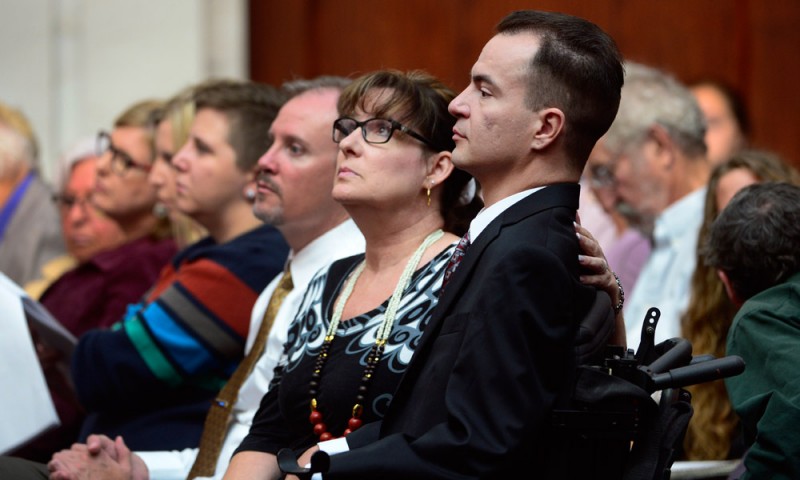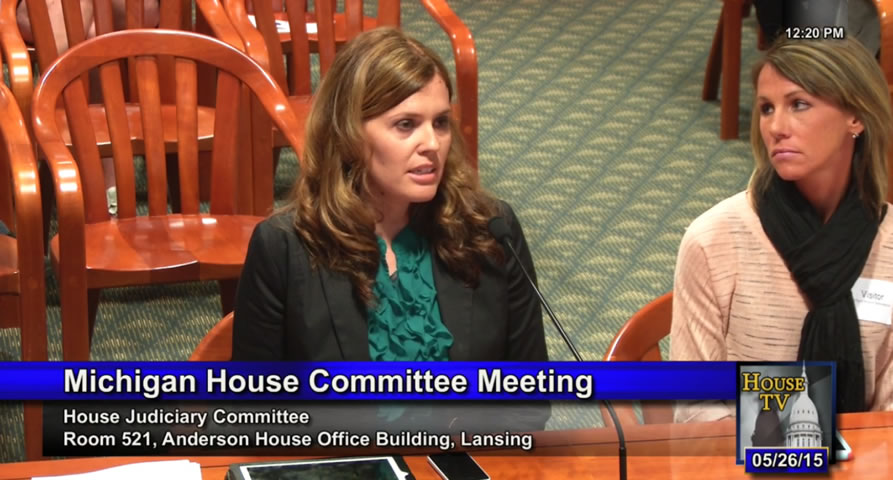
Jul 22, 2015 | Blog, Medical Marijuana Attorney Michael Komorn, Michigan Medical Marijuana Act, Michigan Medical Marijuana Association, News
Activists are screaming mad at the conduct of officials representing Governor Rick Snyder’s administration during a hearing today to determine if autism should be added to the list of illness that qualify a patient to use medical marijuana in Michigan. The petition, submitted in 2014, contains a summary of 75 peer-reviewed articles on autism and 800 pages of reference material. ”When the panel sat down today, what they had was pieces of the document,” said Southfield attorney Michael Komorn. Pieces apparently selected by the Attorney General’s office, according to statements made on the record by Board officials. What was missing? “The Summary, with the 75 peer-reviewed studies, and the 800 pages of clinical research on autism and cannabis,” Komorn said. Advocates sued the government in Ingham County Circuit Court to force the Department of Licensing and Regulatory Affairs (LARA) to consider a petition for that purpose submitted in 2014 by Lisa Smith, whose son Noah has autism and other illnesses. Petitions are debated by the Medial Marihuana Review Panel (the Board) under rules established in 2008 by the Michigan Medical Marihuana Act (MMMA). A previous petition to add autism to the MMMA was rejected at a Board hearing back in 2013. “We litigated for a year,” to get the Smith petition accepted, Komorn said. The State was represented by the Office of the Attorney General, Bill Schuette. The language of the MMMA requires that each petition properly submitted must be considered by the Board. Schuette’s and LARA’s response was the opposite: we already ruled on that illness and no subsequent petition will be considered. “The Court decided theirs was a wrong interpretation. We won; they had to give us a new hearing on the petition submitted.” A hearing on the Smith petition was held in May of this year. On July 1 a whole new Board was created, per rule changes made in January 2015 by LARA over the objections of citizens and Senators. Some of the members of the new panel had not heard the testimony on the Smith petition taken by the Board weeks earlier. “When the Board assembled today we were expecting a vote yea or nay on the petition,” Komorn related. “Before we were able to begin the conversation it was brought to the attention of the Board as a whole by (Board member) David Brogren that this very comprehensive document with supporting papers was not given in its entirety to the Board, and that the Board should consider the entire package before voting.” The science was scrubbed from the document given to the Board for consideration, Komorn said. “When the Circuit Court made an order that the petition be considered, they meant the whole petition,” Komorn growled. ”(The Court) didn’t change the material submitted, it required the Board to consider the petition filed with the Court.” Of a greater concern is the reason cited for the edited version of the petition being presented. Along with a new Board comes a new leader, and the newly-appointed Board made selecting a new Chair their first priority. When the confusion regarding the petitions was exposed, her reaction was not one that inspired confidence among the hearing’s attendees. “The statement she made on the record was very distressing, that this information was given to the board by the Attorney General, not the Court,” Komorn said. “The Attorney General’s role was referenced by (the Chair), who said, in response to Brogren, this is what was sent to us by the Court via the Attorney General.” “The representative kept referring to the fact that this document is what the Attorney General’s office gave us,” said Jamie Lowell of Ypsilanti’s 3rd Coast Medical Marijuana Dispensary, who attended the hearing. Brogren mentioned on the record that he had given the Board the petition in its entirety two weeks ago. Even after the issue was exposed, Komorn said the Chair seemed more concerned with spin control than she was with establishing proper process. Komorn explained that “she kept insisting that the Board had all the information they needed to make a decision on autism and medical marijuana,” he said, “without seeing any of the science behind it.” Brogren’s objections to considering the issue without all the facts swayed the result and stayed the Board from voting. They will reconvene at a later date to make a final determination on the Smith petition, after receiving the entire document. In addition to being a criminal defense attorney, Komorn is the host of an Internet-base radio program broadcasting weekly for more than four years. The Planet Green Trees Radio Show (PGT) has followed the progress of the autism petition from the start, prior to 2012’s initial rejection. Shows #255 and #257 covered the topic with interviews and behind-the-scenes looks at the tribulations experienced by those advocates who sought a positive result at the July 20 hearing. One of those interviewed by the PGT staff: Dr. Harry Chugani, chief of pediatric neurology at Children’s Hospital of Michigan in Detroit “There was a major flaw in the process of how information was being given to the Board members,” Komorn stated. He challenged the notion that the Attorney General, a noted medical marijuana detractor and a major opponent of the MMMA in 2008, should be filtering information approved by the Court for use by a state agency. “Mind you, the AG had to be sued to bring this information to the Board in the first place,” Komorn emphasized. “Why is it OK for the Director of this Board to rely on them for the information used to make the determination of autism’s validity for inclusion on the medical marijuana program?” As a barometer of governmental efficiency, Komorn gave the Board’s actions today two thumbs down. “This Board is not operating in a way that anyone in the public would appreciate… this behavior should do nothing but bring concern from citizens… I don’t think that anyone that walked out of that room has one bit of confidence in the integrity of the process.” “I’d like to believe in the possibility of a fair hearing, but after experiencing the Attorney General in action over the years I can’t help but believe today’s behavior, creating unnecessary confusion and restriction, is intentionally designed to lead to a negative outcome,” Lowell observed. “I really hope I am wrong.”
Source: The Compassion Chronicles by Rick Thompson at 6:15 AM on July 21, 2015

Jul 22, 2015 | Medical Marijuana Attorney Michael Komorn, News, Uncategorized
A blog article from the Metro Times by Larry Gabriel features a quote by Attorney Michael Kormorn.
Some excerpts from the article…
Last week the Detroit Medz shop on Detroit’s west side was raided for “selling marijuana outside the provisions of the state medical marijuana act,” says Sgt. Cassandra Lewis of the Detroit police media relations department. News reports said police found two guns, 4,100 grams (about 9 pounds) of marijuana, and arrested one person — although Lewis says two individuals were arrested that evening.
Lewis says that there were complaints from the community and that police previously had made undercover buys there, although it’s not clear if those undercover buys were made by people with state cards (or fake ones as has been done in the past) or by folks who just walked in with nothing to show.
So far no charges have been announced.
Tate has had Winfred Blackmon and his Metropolitan Detroit Community Action Coalition (MDCAC) riding his ass for several months regarding dispensaries in the city. I went to a couple of meetings early on and have been receiving Blackmon’s email alerts since then. Early on, it was obvious that MDCAC members didn’t want to see marijuana, medical or otherwise, in their neighborhoods. They have an old-school attitude. Early on, their complaints included the fact that most dispensary locations painted their storefronts green — as if that matters.
MDCAC has been pushing Tate, who represents District 1, to do something about what they call “illegal marijuana provision centers.” They’ve been riding city attorney Butch Hollowell too.
Truthfully, the city has been slow to address the issue. I’ve noticed a distinct tendency to avoid talking about marijuana by city officials while places such as Ann Arbor, Ypsilanti, Lincoln Park, and elsewhere have set up rules regarding dispensaries. Now those cities have not been going through their mayor being indicted and convicted, switching from an at-large to a district city council system, having an emergency manager, and a bankruptcy. However, it would be good from a number of viewpoints to set the rules about dispensaries.
That said, the MDCAC model is not a liberal one. Although over time, as they have come to accept that medical marijuana is not going away, they have lightened up some. Originally, they wanted only one dispensary per council district, which would mean only seven in the entire city. Their current proposal seeks to limit the number of dispensaries and limit their locations to industrial zones, mandates that they cannot be near a church, school, daycare or nursery, and proposes a number of inspections and permits before they can open.
This may be a case of the squeaky wheel getting the oil.
“They chose this very uncivilized manner to try to make an example of this one particular facility,” says Southfield-based attorney Michael Komorn, who heads the Michigan Medical Marijuana Association. “There is no rule prohibiting [a location near a school], no rule. … Maybe that’s something they should think about doing — regulate this in a way that satisfies the community.”
Maybe the Detroit Medz folks were selling to people who aren’t registered patients, but the rest of this seems to be pure political theater.
Larry Gabriel writes the Stir It Up and Higher Ground columns for the Detroit Metro Times.
Read Full Article Here

Jul 16, 2015 | Criminal Defense Attorney Michael Komorn, Marijuana Criminal Defense Attorney Michael Komorn, Medical Marijuana Attorney Michael Komorn, News
The Detroit police raided and made arrests at marijuana dispensary in an article in the Detroit Free Press from July 14, 2015.
Detroit police arrested two people and confiscated two firearms and drugs during a raid on a marijuana dispensary Tuesday afternoon.
Police seized 4,100 grams of marijuana (about 9 pounds), and removed 12 edible marijuana foods from the shelves at Detroit Medz, said Sgt. Cassandra Lewis of Detroit police Media Relations.
According to state law, only Michiganders who possess state registry cards can legally use medical marijuana, but at the shop “they were just selling to anybody who walked in,” she said.
Detroit does not have an ordinance regulating dispensaries. Detroit police favor having dispensaries be regulated, “so that it’s safe not just for the customers but also for the community,” Lewis added.
A local ordinance, spelling out what Detroit authorities expect of the city’s dispensaries, would protect legitimate operators and weed out any that are undesirable, added Southfield attorney Michael Komorn, president of the Michigan Medical Marijuana Association.
But without such regulation in place, Tuesday’s raid was ill-advised because Detroit police should focus on violent crime – not dispensaries, Komorn said.
“I can’t speak to this specific location, but there’s a lot of dispensaries operating in Detroit and it’s unfortunate that Detroit’s leaders and citizens seem to be at odds about whether they should be there. Some people still see medical marijuana as just dope,” he said.
“These places are not causing lawlessness and they’re not hurting property values in the city,” Komorn said.
Some law enforcement agencies claim all dispensaries are illegal until the state Legislature passes a law allowing them. State Attorney General Bill Schuette agrees with that assessment.
The city of Detroit is overdue for regulating its fast-spreading dispensaries, said Winfred Blackmon, a community leader in northwest Detroit who is outspoken about medical-marijuana commerce.
Read the article here Detroit Free Press Article – Detroit Dispensary Raid

Jun 18, 2015 | Criminal Defense Attorney Michael Komorn, Marijuana Criminal Defense Attorney Michael Komorn, Medical Marijuana Attorney Michael Komorn, Michigan Medical Marijuana Criminal Defense Attorney Michael Komorn, News
On November 8th, 2008, by a majority of 63 percent, the citizens of the State of Michigan voted into law the constitutional initiative, Initiated Law 1 of 2008, ratified into law December 4, 2008, herein referred to as the Michigan Medical Marihuana Act, MCL 333.26421 et seq. (the “MMMA”).
The voters of the State of Michigan, who at that time had no reason to believe a need to prevent misconstruction, misinterpretation, or abuse of its intent, upon this day declare that certain basic rights afforded all the citizens of Michigan are not being recognized for the medical marihuana community, to the extent that the following rights must be decreed, declared, recognized, and adopted, as the
Michigan Medical Marihuana Patient Bill of Rights
All patients possess the following rights, without limitation:
- There shall be a presumption that registered patients and their caregivers are in compliance with the MMMA.
- The right to be treated reasonably, with dignity and respect, by law enforcement and the government, and by the medical community and private business in general. “Reasonable” should be based in part upon the best available medicine and science, and not upon emotion or politics.
- The right to be protected against arrest, prosecution, or any penalty.
- The right to be free from searches, seizures, and forfeiture.
- The right to equal protection under the law.
- The right to privacy, of any and all information related to patient or caregiver status.
- The right to the best medical care, and to the best medication in the proper delivery form, to treat their condition, disease, or debilitation.
- The right to safe, immediate access to a continuous supply of medication to treat their condition, disease, or debilitation, and the right to a choice of where to obtain that medication.
- The right to equal employment.
- The right to equal and fair housing.
- The right to be protected from denial of custody or visitation of a child.
- The right to speak, the right to remain silent, and the right to counsel.
- The right to civil remedies and punitive damages against those who violate any of these rights.
- The right to prosecute those who violate the protections of the MMMA.
- The right to protection under the Victim Rights Act of Michigan.

Jun 16, 2015 | Criminal Defense Attorney Michael Komorn, Legalization, Medical Marijuana, Medical Marijuana Attorney Michael Komorn, News
The Colorado Supreme Court ruled Monday Jun 15, 2015, that Employers’ zero-tolerance drug policies trump Colorado’s medical marijuana laws.
In a 6-0 decision, the Colorado Supreme Court affirmed lower court rulings that businesses can fire employees for the use of medical marijuana even if it’s off-duty.
Colorado became the first state to provide guidance on a gray area of the law. With the ruling, which was a blow to some medical marijuana patients and a sigh of relief to employers.
The decision came nine months after the state’s highest court heard oral arguments in Brandon Coats’ case against Dish Network.
Coats was rendered a quadriplegic by a car accident He had a medical marijuana card and consumed pot off-duty to control leg spasms. He was fired in 2010 after failing a random drug test.
Coats, who was a customer service representative for Dish, challenged the Douglas County satellite TV company’s zero-tolerance drug policy, claiming that his use was legal under state law. His firing had been upheld in both trial court and the Colorado Court of Appeals.
When the case went to the state Supreme Court, legal observers said the case could have significant implications for employers across Colorado. They noted that the ruling also could be precedent-setting as Colorado and other states wrangle with adapting laws to a nascent industry that is illegal under federal law.
At the crux of the issue was whether the use of medical marijuana — which is in compliance with Colorado’s Medical Marijuana Amendment — was”lawful” under the state’s Lawful Off-Duty Activities Statute.
That term, the justices said, refers to activities lawful under both state and federal law.
“Therefore, employees who engage in an activity, such as medical marijuana use, that is permitted by state law but unlawful under federal law are not protected by the statute,” Justice Allison H. Eid wrote in the opinion.
Current Colorado law allows employers to set their own policies on drug use.
Coats’ attorney Michael Evans, of Centennial-based The Evans Group, called the decision “devastating.”
He said he does not plan to take the case to the U.S. Supreme Court.
“You need the Colorado Supreme Court to stand up for its own laws,” he said. “The U.S. Supreme Court is not going to do that.”
Read More and See Related Info Here

Jun 13, 2015 | Medical Marijuana, Medical Marijuana Attorney Michael Komorn, Michigan Medical Marijuana Criminal Defense, News, Uncategorized
A recent (6/8/15) editorial in the Livingston News visited the Michigan forfeiture laws which has become a hot topic lately.
The editorial goes on to say…
“When law enforcement agencies raid a suspected drug dealer’s home and confiscate property such as cars, money or other items, we understand this.
Police don’t want criminals to benefit from their illegal activity.
However, what happens if there is no conviction?
That property should and would be returned, one would think.
However, that’s not the case in Michigan, and we’re glad our state Legislature is working to reform civil asset forfeiture. The current forfeiture rules must be fixed because they allow police to confiscate items even if it’s determined there was no crime committed.
Michigan’s Civil Asset Forfeiture laws allow police to take property from citizens if they suspect a crime was committed, even when there is not enough evidence to charge them. Homeowners must then prove they did not purchase their property with proceeds from criminal activity and sue to get the property back.
In many cases, police raid a home where there clearly is no drug dealing happening; instead, residents are involved with medical marijuana, which voters stated is a legal use here in Michigan.
The following are a couple examples of how regular citizens were caught in the unjust web of forfeiture laws.
Gin Hency and Annette Shattuck describe themselves as soccer moms, active in their communities and in their children’s lives. Since July 2014, the St. Clair County women have shared another similarity: Both of their homes were raided by the St. Clair County Drug Task Force. Hency and Shattuck are registered medical marijuana caregivers. Among the things taken in the raid were their medical marijuana cards issued by the state, televisions, a bicycle and documents including driver’s licenses and insurance cards.
Another item reported taken was Hency’s vibrator (yes, a sex toy).
“It was devastating,” Shattuck said.
Hency and Shattuck were charged with marijuana-related counts several months after the raids. Three of the six charges against Shattuck were dismissed. Both charges against Hency were dismissed this month, but she has still been unable to reclaim her property.
Another example occurred with Thomas Williams, who was alone in November 2013 when police raided his rural St. Joseph County home wearing black masks, camouflage and holding guns at their sides. They broke down his front door with a battering ram.
“We think you’re dealing marijuana,” they told Williams, a 72-year-old, retired carpenter and cancer patient who is disabled and carries a medical marijuana card.
When he protested, they handcuffed him and left him on the living room floor as they ransacked his home, emptying drawers, rummaging through closets and surveying his grow room, where he was nourishing his 12 personal marijuana plants as allowed by law. Some had recently begun to die, so he had cloned them and had new seedlings, although they were not yet planted. That, police insisted, put him over the limit.
They did not charge Williams with a crime, though.
Instead, they took his Dodge Journey, $11,000 in cash from his home, his television, his cellphone and his shotgun — and are attempting to take his Colon Township home. And they plan to keep the proceeds, auctioning off the property and putting the cash in police coffers.
More than a year later, he is still fighting to get his belongings back and to hang on to his house.
“I want to ask them, ‘Why? Why me?’ I gave them no reason to do this to me,” said Williams, who says he also suffers from glaucoma, a damaged disc in his back, and COPD, a lung disorder. “I’m out here minding my own business, and just wanted to be left alone.”
We ask the same question: Why?
There’s no reason except that police have certain laws that allow for this type of forfeiture.
A bipartisan package of bills, approved by a House committee, would make changes including raising the standard for forfeiture to the highest in civil court, one of clear and convincing evidence rather than a preponderance of the evidence. The bills would also require detailed reports from local police to the state police on property forfeited.
It’s a good first step, and we hope to see it approved so residents don’t have to worry about property getting taken when they’re broken no crimes.
— Livingston Daily Editorial Board
Visit the Article Here






